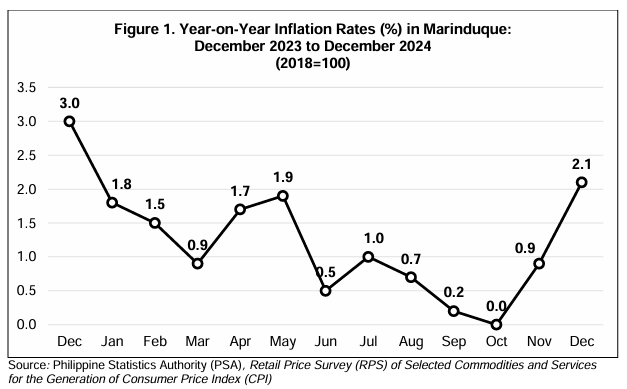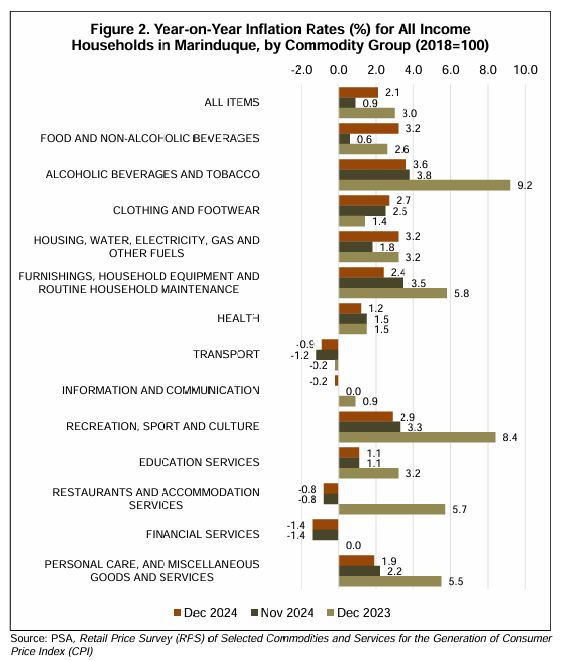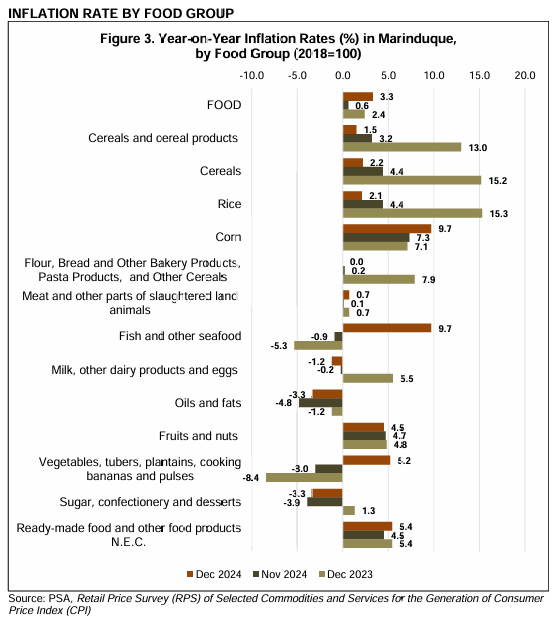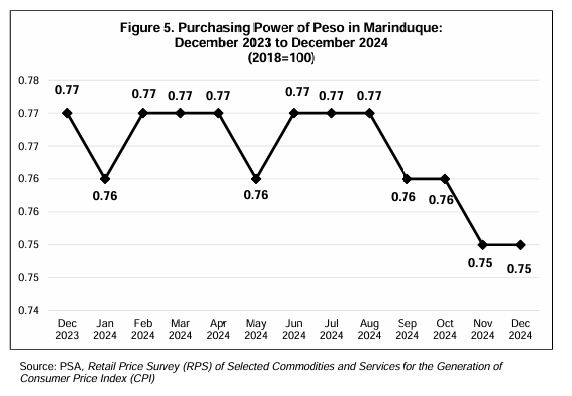

The headline inflation rate at the provincial level further increased to 2.1 percent in December 2024, or a change of 1.2 percentage points from the inflation rate in the previous month. In the same reference month of the previous year, it was posted at 3.0 percent. The uptrend of inflation in December 2024 was mainly driven by the combined acceleration in the indices for selected commodity groups such as food and non-alcoholic beverages at 3.2 percent, housing, water, electricity, gas and other fuels at 3.2 percent, and transport at -0.9 percent.

Furthermore, the annual index of clothing and footwear also showed higher growth compared to the figures from the previous month, at 2.7 percent.
On the other hand, lower annual increments were observed in the inflation rates of the following commodity groups:
• Furnishings, household equipment and routine household maintenance, 2.4%;
• Personal care, and miscellaneous goods and services, 1.9%;
• Alcoholic beverages and tobacco, 3.6%;
• Recreation, sport and culture, 2.9%;
• Health, 1.2%; and,
• Information and communication, -0.2%.
Meanwhile, the indices of the following commodity groups maintained compared with the annual figures from the previous month:
• Education services, 1.1%;
• Restaurants and accommodation services, -0.8%; and,
• Financial services, -1.4%

The province’s food index further accelerated to 3.3 percent in December 2024, from 0.6 percent in the previous month. This was equivalent to a change of 2.7 percentage points. In December 2023, the food inflation rate was lower at 2.4 percent. The uptrend in food inflation was mainly due to the acceleration in the indices of Fish and other seafood at 9.7 percent, vegetables, tubers, plantains, cooking bananas and pulses at 5.2 percent, and meat and other parts of slaughtered land animals at 0.7 percent.
Furthermore, the annual indices of the following food items exhibited higher growth when compared with the annual figure from the previous month, as follows:
• Ready-made food and other food products N.E.C., 5.4%;
• Oils and fats, -3.3%;
• Sugar, confectionery and desserts, -3.3%; and,
• Corn, 9.7%.
On the other hand, the annual indices of the following food items exhibited lower growth when compared with the annual figure from the previous month, as follows:
• Rice, 2.1%;
• Flour, Bread and Other Bakery Products, Pasta Products, and Other Cereals, 0.0%;
• Milk, other dairy products and eggs, -1.2%; and,
• Fruits and nuts, 4.5%.
PURCHASING POWER OF PESO
The Purchasing Power of Peso (PPP) in Marinduque maintained at PhP 0.75 in December 2024. The PPP was registered at PhP 0.77 in December 2023. As a result, the amount of goods that can be presently purchased by consumers were fewer compared to when the PPP was higher.

TECHNICAL NOTES
• Consumer Price Index is an indicator of the change in the average prices of a fixed basket of goods and services commonly purchased by households relative to a base year.
• Market Basket is a sample of goods and services, which is meant to represent the totality of all the goods and services purchased by households relative to a base year.
o To determine the commodities that will form the market basket for the 2018-based
CPI, the Survey of Key Informants (SKI) was conducted in March 2021. The
survey, which was conducted nationwide to store managers, sellers or proprietors,
obtained information on the most commonly purchased goods and availed services
by the households.
o The commodities in the 2018-based CPI market basket are grouped/classified
according to the 2020 Philippine Classification of Individual Consumption
According to Purpose (PCOICOP) which is based on the United Nations COICOP. Meanwhile, the commodities in the 2012-based CPI market basket used the 2009 PCOICOP version of classification of commodities.
• Base year is a reference period, usually a year, at which the index number is set to 100. It is the reference point of the index number series. The CPI is rebased from base year 2012 to base year 2018.
• Inflation Rate is the annual rate of change or the year-on-year change in the Consumer Price Index (CPI).
• Purchasing Power of Peso is a measure of the real value of the peso in a given period relative to a chosen reference period. It is computed by getting the reciprocal of the CPI and multiplying the result by 100
Inflation Rate (reference month, reference year)
= [(CPI (reference month, reference year) - CPI (reference month, previous year)) / CPI (reference month, previous year)] x 100%
For example,
INFLATION RATE (December 2024) = [(CPI (December 2024) - CPI(December 2023)) / CPI(December 2023)] x 100%
= [(133.5 – 130.7) / 130.7] x 100%
= (2.8 / 130.7) x 100%
≈ 2.1%
(SGD)GEMMA N. OPIS
Chief Statistical Specialist
PSA PSO Marinduque

